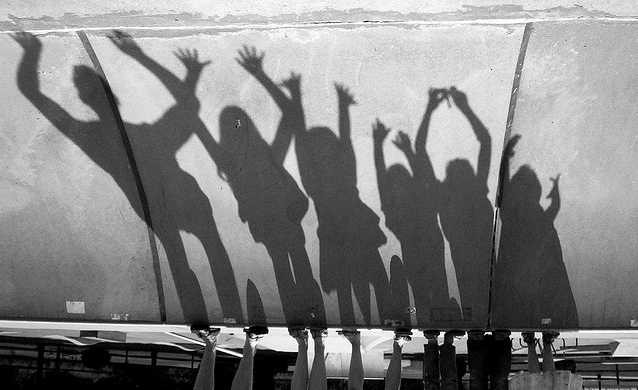Theme Essay by David Biddle
Transcending the “I’m Fine” Syndrome

I was adopted in 1958. I was nine weeks old. Yet, it wasn’t until my mid-forties that I started figuring out what had been missing from my family story.
In the summer of 2002, I took a 600-mile road trip with my wife and kids to find my birth mother. The trip was life changing, but one of the most transformative aspects of that quest came after I returned home, when I began making sense of it. I’d found the woman who gave birth to me; I’d met her husband, my new stepfather, and learned that I had three half-brothers. I had a new family, my original family, and I felt a surprising fondness for them. But I also felt a murky distance as well.
I decided I'd write about what had happened by using an innovative new Web application at the time: a blog. This was my first experience with blogging, and in the beginning, I had no intention of making my words public. Every few days, I just sat in front of my computer monitor and typed.
After a few entries, though, I realized I was unwinding all sorts of emotional coils, confronting odd paradox bumps about how I’d lived my life until I met my birth mother. There I was, nearly 45 years old, with more than two decades of writing experience—as a freelancer and a closeted novelist—suddenly discovering I’d never had any idea who I was.
The luckiest adoptees grow up with something I think of as the “I’m Fine” Syndrome. If we’ve been adopted by loving families, we’ve been told all our lives we’re no different from our naturally conceived siblings. We don’t know where we came from, but we’re fine with that—just fine, thank you very much.
In my case, I was also fine with the fact that my official birth certificate only listed my adoptive parents. That document basically said I wasn’t adopted at all—but I never questioned this version of the family story. I’m fine.
I didn’t know anything about my racial heritage, either. My adoptive family referred to me as mixed race, but no one knew any details beyond my dark features and light brown skin. That’s fine. I honestly would have told anyone who asked that I didn’t want to know about my true origins.
But with each blog post, it became increasingly clear that I’d never really been fine. I began to see important events throughout my life in a completely different light. I remembered learning about racism firsthand, at the age of three, when our black housekeeper tried to take me into a “whites only” drugstore in Missouri. I was in the throes of toilet training and needed desperately to use the bathroom. At Mrs. Green's quite bold insistence, they let me in, but made her stay outside.
I recalled my intense attachment to our family pets. Even beyond conscious awareness, I’d understood that pets were adopted just like me. I realized how oddly alone and cut off from other people I'd always felt growing up—something I’d never acknowledged to anyone, especially myself. I wanted to know why my birthparents couldn’t keep me. I wanted to know what tribe or tribes I belonged to. What was my mix? Was I part Jewish, Italian, African, Native American, Hispanic, Irish? What was I? What am I? The gaps in my history weren’t fine at all.
Such gaps in self-knowledge aren’t fine for anybody. The way we’ve been trained to see the world often masks how we really feel about our circumstances. Consider the tough guy who just powers through losing his wife. Or the enabling children and wife who struggle with an alcoholic father and husband. Or those who live with mental illness. We’re all “fine.”
Except we’re not. After the fact, it can seem so obvious it’s alarming. I was finally getting a major dose of what it means to write about emotional reality. I kept writing, and the self-knowledge kept coming. And I wasn’t just learning about myself—I was learning how confusing emotional reality is for everyone.
• • •
The more I wrote, the more honest I became about my feelings and memories of what it was like growing up adopted. After only a few weeks of blogging, I had slipped into memoir mode, something I’d never intended. My blog, called The Formality of Occurrence, wasn’t public at that point, but the potentially public venue of blogging led me to entries that turned into memoir scenes and reflections.
Memoir is tricky. All my biases and filters and blinders began to pop up, especially my family loves me, they chose me, stay with the story that made everyone feel safe. Worse, memoir is a memory game. I understood quickly that the people I loved didn’t recall events the way I did. I was bound to cause consternation, if not unmitigated pain, by puzzling things out using the pieces of recollection that were peculiar to me.
Writing about adoption is even trickier. I think of normal families as people connected in a straight line—father, mother, siblings, extendeds—but adoption doesn’t create family relationships in a linear way. This more complex web is often referred to as the “adoption triad” by social workers and other experts: There’s the adopting family, the family giving a child up for adoption, and the adopted person. In writing his or her story, the adopted person has the ability to connect at least two separate family strands together. But if you try to find your birth parents, as I did, the feelings of everyone in the triad rise to the surface all at once.
I soon realized that telling the story of growing up in my adopted family to my birth family would also be a major unveiling of who I became without them. I knew from the start of this writing project that reading a description of what it felt like to meet my birth mother would be a very disorienting experience for my adoptive family.
Again, the “I’m Fine" Syndrome was at work—and not just for me. Everyone in my triad had been living a version of that syndrome for a long time. So I knew my words had the potential to jettison the equilibrium of my birth mother, my adoptive parents, both my adoptive and birth siblings, my wife and sons.
My wife, Marion, was the first person I shared my blog with. She saw where it was headed immediately and encouraged me to show others—one person in particular. By this time, I'd amassed a good eight to ten entries. I cleaned up the first one and then emailed my birth mother with its Internet URL and permission to access it.
Within a day, she wrote back and wanted more. So I posted another entry. She wanted more. So did Marion, and when close friends and family learned I was beginning to make this story available, they wanted to follow along, too.
 • • •
• • •
Those few months of blogging taught me more about writing than I'd learned in over twenty years as a professional. You always have a choice when you write in the public sphere. You can make stuff up or you can be honest. For me, being honest became a game of seeing how many layers of "I'm fine" I could peel away.
By the time I was done blogging out my notes, I’d learned the thrill of being emotionally naked. I'd also learned that when I truly spoke from the heart, it was okay if my memories weren’t the same as those of my family members. That's the only logical way to be the third leg of the adoption triad. I could only join those two families by being honest and truthful about how it made me feel.
Many of us, writers and readers, don’t get to a full awareness of this inner landscape easily. We tell all sorts of stories about our families—how great they are, how goofy—because such summaries are the easy part. But the truth requires getting past “we’re fine.” In my case, it took the cathartic experience of finding my birth mother. I also needed to noodle around with a new authoring process in order to stumble on an emotional reality that had been under the surface for too long.
I wasn't fine. I'm still not fine. But my life is enriched now in so many new ways.
Excerpt from The Formality of Occurrence
The demons come back when we return to our motel room. The ventilation system doesn’t work well, and there are no controls. The room is a perfect 78 degrees with moderate humidity, but I want it 72, and I want a unit that will allow me to drive the humidity well below 50 percent.
We go to bed, all four of us, and I lie there feeling the heat prickle my skin, thinking about the fact that I am driving to Indiana with nothing but the name of a high school student from the 1950s.
In order to fall asleep, I count the things I want to take back in my life. There are many of them. I have cheated, lied, stolen money, and shoplifted. I’ve manipulated the lives of those I love. Most of my major decisions were made in order to please others. My ego drives what I accomplish. I am a materialist. I want desperately to be rich. I’ve done worse, too, far worse. The worst thing, though, I realize in the dark, is that I’ve worked so hard to appear to others as a good person—a noble, decent, gentle man with positive, progressive values—that I’m no longer sure who I really am. “You’ve worked hard,” I think, “at covering up what a shit you have become.”
I drift across a sea of sleep, bumping into myself over and over, wondering about all of my transgressions, wondering if they’re somehow related to being adopted. If you aren’t connected, if you’re untethered, isn’t it inevitable that you will be at least slightly morally off-center and selfish? I usually do the right thing in life, probably more than some, but occasionally I make mistakes. And when I do, there is nothing to face. No guilt. Nothing. I am alone and floating outside the rest of the world. I am a mistake, an alien, a lone wolf cut off from the pack. I struggle to find sleep in the incessant heat of the room and tumble in and out of guilt and self-consciousness.
There are moments in all of this, while I drift, where I understand things better. At one point in the night, I realize that loneliness might be a good thing. It is the root cause of my ability to love others. It is the source of my deep need to find, and my belief in, true love. I went through so much to discover that love, to find Marion.
That same loneliness is filled every day being around my sons. The desperation of my situation in the world has been salved by my family, but it has not been eliminated. I lie in a room on the sixteenth floor of the Pittsburgh Ramada Inn, and I can only be cured of this desolation by overcoming my adoption, by understanding, at least in part, the formal reasons for why I have occurred.
I’ve dreamt of wolves and wild dogs my whole life. Sometimes I am in my house sitting alone at the kitchen table. There are house noises all around me, common house noises: a ticking clock, the refrigerator’s compressor, the far-off sound of a vacuum sweeper; maybe I forgot to turn the water off in the sink. A wolf comes into the room. He is panting and salivating. I smell him. Death out of the dark. His eyes are ice-cave blue, his fur the color of burned forest and dust. And then he’s gone. I’m afraid I will forget. I’m afraid I won’t remember he was there.
 It’s sunrise, the air is moist and thick, a pack of wild dogs goes noisily through our back yard, mongrels bred of pit bulls, boxers, bull dogs, and mastiffs, some with huge, almost bald skulls, bulging eyes, vicious snarls. They breathe in unison, messengers of fear cruising through our suburban neighborhood, looking to fall on any living thing, flesh on their minds. I struggle to figure out if I’m dreaming. Our suburb is on the edge of a great, sprawling metropolis. The pack ambles through our yard, then silence.
It’s sunrise, the air is moist and thick, a pack of wild dogs goes noisily through our back yard, mongrels bred of pit bulls, boxers, bull dogs, and mastiffs, some with huge, almost bald skulls, bulging eyes, vicious snarls. They breathe in unison, messengers of fear cruising through our suburban neighborhood, looking to fall on any living thing, flesh on their minds. I struggle to figure out if I’m dreaming. Our suburb is on the edge of a great, sprawling metropolis. The pack ambles through our yard, then silence.
The yard is vacant. I am looking out the window, standing on my bed, wondering if what I saw was real. Sometimes you’re the wolf. Sometimes you’re the dog. Sometimes he’s just there, like in the kitchen—watching, waiting, moving through.
A single dog finally comes into the yard. Unable to run with the pack, he seems too goofy and deranged to belong in the group. He is the quintessential mongrel: part shepard, part lab, part beagle, part golden retriever. Sometimes I am that dog, and sometimes he is me.
From the end of Chapter One, The Formality of Occurrence by David Biddle, 2003. To read the complete version of this chapter, click here.
Art Information
- "Child Walking on White Round Spheres Balance" © D Sharon Pruitt; Creative Commons license.
- "Daddy and His Little Shadow Girls at the Skate Park" © D Sharon Pruitt; Creative Commons license.
- "Lost Dog" © Beverly; Creative Commons license.
 David Biddle is a contributing writer at TW, where he regularly publishes his Talking Indie column about the ups and downs of independent publishing.
David Biddle is a contributing writer at TW, where he regularly publishes his Talking Indie column about the ups and downs of independent publishing.
You'll find information about his novel Beyond the Will of God and other digital fiction on davidbiddle.net.
For more about David’s search for his birth mother and what storytelling means to adoptees, see his TW essay “Always an Orphan” (November/December 2011).
